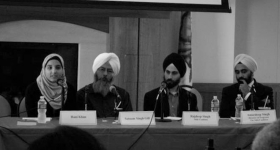Prof. Lena Edlund of Columbia University ... and her colleague Prof. Douglas Almond studied 2000 census data and published their results last year ...
In
general, more boys than girls are born in the United States, by a ratio
of 1.05 to 1. But among American families of Chinese, Korean and Indian
descent, the likelihood of having a boy increased to 1.17 to 1 if the
first child was a girl, according to the Columbia economists. If the
first two children were girls, the ratio for a third child was 1.51 to
1 — or about 50 percent greater — in favor of boys.Studies have not detected a similar preference for males among Japanese-Americans.
The findings published by Professors Almond and Edlund were bolstered this year by the work of a University of Texas
economist, Prof. Jason Abrevaya. He found that on the basis of census
and birth records through 2004, the incidence of boys among immigrant
Chinese parents in New York was higher than the national average for
Chinese families. Boys typically account for about 515 of every 1,000
births. But he found that among Chinese New Yorkers having a third
child, the number of boys was about 558.
We've written about sex selection before on this blog, and I don't need to add sadness and horror to Neela's and Momo's responses.
But I do want to caution people against a simplistic assumption that
it's all purely misogyny that causes sex selection in favor of boys.
Yes, the underlying cultural assumptions are themselves misogynistic,
but whole cultures are so bound up in patriarchal structures, that
pulling out one thread won't unravel the whole.
In my own Chinese family, among the children of my mother's generation,
there are eleven girls and three boys. Two of my boy cousins have
finished having children: they have all girls (six of them!) That
leaves my one boy cousin (who has no children ... yet) to carry on the
family name. Although I don't think there's really any pressure on him
to do so, I'll admit to a little sadness that the family name may pass
with our children's generation. (Don't get me wrong, we're a
girl-loving family, and aside from one or two value-free observations
that the family name will probably pass, no one has said anything
negative about it.)
Yes, of course one of the girls can take the family name and pass it on
to her children ... only no one has so far, and no one in our
generation will. (There's still hope for the next generation) There are
way too many rules that would need to be broken for that to happen. And
once it did happen, would anyone else accept it? Because the importance
of the family name is not just personal; it's communal, and societal.
Will a family name continue to be important if it ceases to be passed
patrilineally in a patrilineal society?
And that's just one of the cultural issues -- a relatively small one --
that people have to contend with when making these decisions. A person
may understand that it's wrong to prefer boys, and still not want to
become less important in their family's eyes by having only girls. Or a
person may love having girls and intend to raise their girls equal to
their boys ... yet still feel the importance of having both and
satisfying both aspects of their cultural responsibilities.
What do you guys think? Do you have similar situations in your families? And how have these issues been resolved?









Comments